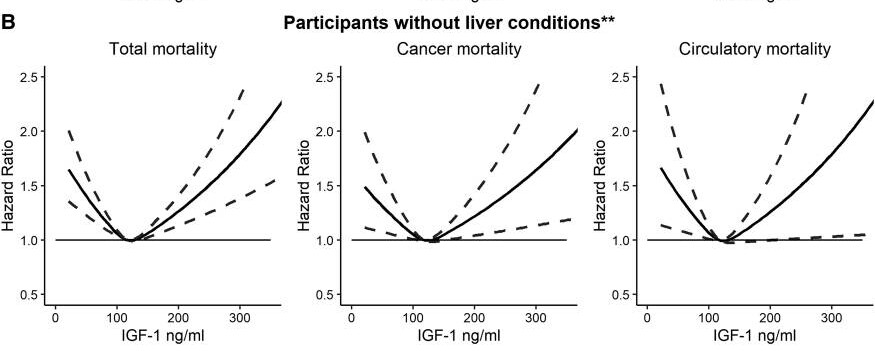It is a complex issue, in fact, on the other side, it seems that low levels of IGF-1 may also be associated with higher cancer mortality, implying maybe that cancer can proliferate even with low concentrations of this specific growth factor. I can imagine a mechanistic cause like too low IGF-1 = excessive mTOR inhibition in the immune system = decreased immune response to cancer cells.
Both low and high serum IGF-I levels associate with cancer mortality in older men - PubMed.
J Clin Endocrinol Metab
. 2012 Dec;97(12):4623-30.
doi: 10.1210/jc.2012-2329. Epub 2012 Sep 26.
Both low and high serum IGF-I levels associate with cancer mortality in older men
Johan Svensson 1, Daniel Carlzon, Max Petzold, Magnus K Karlsson, Östen Ljunggren, Asa Tivesten, Dan Mellström, Claes Ohlsson
Affiliations Expand
- PMID: 23015658
- DOI: 10.1210/jc.2012-2329
Abstract
Background: Although recent population-based studies suggest a U-shaped relationship between serum IGF-I concentration and all-cause mortality, the distribution of death causes underlying this association remains unclear. We hypothesized that high IGF-I levels associate with increased cancer mortality, whereas low IGF-I levels associate with increased cardiovascular disease (CVD) mortality.
Methods: Serum IGF-I levels were measured in 2901 elderly men (mean age 75.4, range 69-81 yr) included in the prospective population-based Osteoporotic Fractures in Men Study (Sweden) study. Mortality data were obtained from central registers with no loss of follow-up. The statistical analyses included Cox proportional hazards regressions with or without a spline approach.
Results: During the follow-up (mean 6.0 yr), 586 of the participants died (cancer deaths, n = 211; CVD deaths, n = 214). As expected, our data revealed a U-shaped association between serum IGF-I levels and all-cause mortality. Low as well as high serum IGF-I (quintile 1 or 5 vs. quintiles 2-4) associated with increased cancer mortality [hazard ratio (HR) = 1.86, 95% confidence interval (CI) = 1.34-2.58; and HR = 1.90, 95% CI = 1.37-2.65, respectively]. Only low serum IGF-I associated with increased CVD mortality (quintile 1 vs. quintiles 2-4, HR = 1.48, 95% CI = 1.08-2.04). These associations remained after adjustment for multiple covariates and exclusion of men who died during the first 2 yr of follow-up.
Conclusions: Our findings demonstrate that both low and high serum IGF-I levels are risk markers for increased cancer mortality in older men. Moreover, low IGF-I levels associate with increased CVD mortality.

